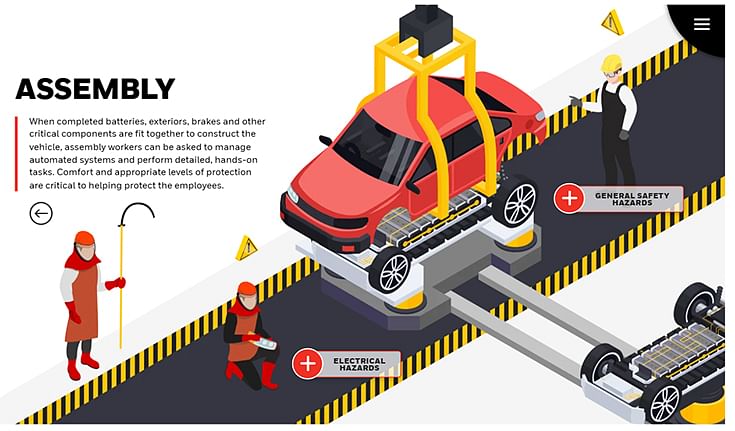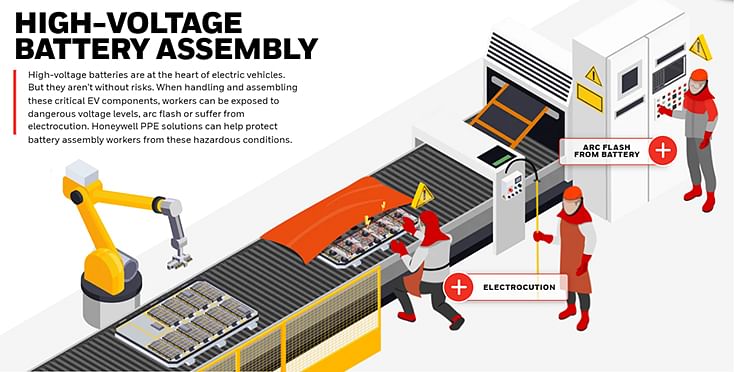Honeywell strengthens safety for lithium-ion batteries and EV industry workers
From manufacturing to driving electric vehicles, Honeywell is using its technologies and expertise to improve safety and advance the transition to electrification worldwide.
Global electric vehicle (EV) sales worldwide have been surging, with 10 million units sold in 2022 and 35% predicted growth by the end of this year to reach 14 million units. However, rising EV adoption and increased lithium-ion (li-ion) battery production also raise safety concerns.
Li-ion batteries that power EVs can lead to dangerous ‘thermal runaway’ incidents causing intense and prolonged electrical fires. Workers assembling batteries face risks like hand injuries, exposure to chemical hazards, and potential electrocution. A focus on safety is crucial in this EV boom, states Honeywell, whose Honeywell Safety and Productivity Solutions (SPS) division provides products, software and connected solutions that improve productivity, workplace safety and asset performance for industry.
To address safety concerns across the spectrum of people involved in EV manufacturing, transport and use — from drivers to EV plant workers to first responders and others — Honeywell has developed a number of ready-now solutions to not only protect individuals and assets, but also to help detect the risk of battery fires sooner.

Manufacturing EVs comes with many risks. Workers need reliable protection against serious thermal, electrical and chemical hazards. EV gigafactories operate in high gear. The rapid pace, plus an abundance of hazards, means having the right PPE is critical to worker safety. The threat of arc flash, burns, hazardous fumes and more create a high-risk occupational ecosystem. Protecting workers means meeting safety standards and regulations and providing top quality PPE.
“Electric vehicles are pivotal for a sustainable future of transportation,” said Victor Verissimo, general manager of electrification for Honeywell Sensing and Safety Technologies. “However, sustainability can’t compromise safety. Honeywell’s portfolio of solutions helps make the production and operation of EVs safer for all involved, helping to play a crucial role in making sustainable travel a reality.”
SAFETY FOR EV OPERATORS
Honeywell’s battery safety sensors, when integrated into EV battery packs, detect thermal runaway risks enabling the warning of passengers and allowing EV manufacturers to meet international battery fire safety standards. Through a strategic alliance with Nexceris, developer of Li-ion Tamer lithium-ion gas detection solutions, Honeywell is developing sensors to detect earlier thermal runaway indicators in EV batteries. This early intervention can help avoid costly property damage or worse, injury to drivers.

A new suite of sensor offerings for enhanced safety in EV batteries and energy storage systems bring the best combination of performance and reliability.
Honeywell’s current sensors provide high-accuracy readings with low-temperature drift to the Battery Management System (BMS) for electrical management protection and state of charge monitoring. The company’s battery safety sensors integrated into EV battery packs enable EV manufacturers comply with the battery fire safety requirements in international standards.
 The battery safety sensors detect early thermal runaway events and communicates to the vehicle system using CAN communication. The battery safety sensors have programmable warning thresholds to fit specific battery configuration.
The battery safety sensors detect early thermal runaway events and communicates to the vehicle system using CAN communication. The battery safety sensors have programmable warning thresholds to fit specific battery configuration.
SAFETY IN GIGAFACTORIES
The demand for EVs is giving rise to more gigafactories — massive battery and electric vehicle factories — and more manufacturing jobs. This battery assembly process poses risks of hand and eye injuries, exposure to toxic and flammable chemicals, electrocution, and ‘arc flash’, when electric current leaves its intended path and travels through the air or to the ground.

To keep the workers who are accelerating the future of transportation safe and help mitigate the inherent risks associated with lithium-ion battery production, Honeywell has comprehensive personal protective equipment (PPE), electrical safety gear and gas detection technology for high-risk areas like electrode mixing, coating, drying, and cell finishing.
SAFETY FOR FIRST RESPONDERS
While sensors can allow for early detection of malfunctions in li-ion batteries, they cannot yet prevent them altogether. In scenarios when a li-ion battery fire does occur, first-responders must be properly equipped to fight these fast-burning, incredibly hot flames. Honeywell states that it has the gear needed to effectively combat the dangerous conditions brought on by li-ion battery fires for fire and emergency services departments.
All images: courtesy Honeywell
RELATED ARTICLES
Autoliv Plans JV for Advanced Safety Electronics With China’s HSAE
The new joint venture, which is to be located strategically near Shanghai and close to several existing Autoliv sites in...
JLR to Restart Production Over a Month After September Hacking
Manufacturing operations at the Tata Group-owned British luxury car and SUV manufacturer were shut down following a cybe...
BYD UK Sales Jump 880% in September to 11,271 units
Sales record sets the UK apart as the largest international market for BYD outside of China for the first time. The Seal...






 By Autocar Professional Bureau
By Autocar Professional Bureau
 17 Sep 2023
17 Sep 2023
 5604 Views
5604 Views





 Ajit Dalvi
Ajit Dalvi




